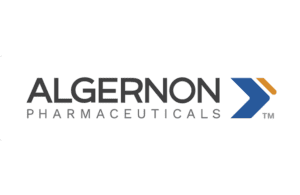 The clinical-stage company Algernon Pharmaceuticals (CSE:AGN; Frankfurt:AGW0; OTCQB: AGNPF) has received approval to run a Phase 1 clinical study of an IV formulation of AP-188.
The clinical-stage company Algernon Pharmaceuticals (CSE:AGN; Frankfurt:AGW0; OTCQB: AGNPF) has received approval to run a Phase 1 clinical study of an IV formulation of AP-188.
The study will explore the drug candidate’s potential, a formulation of the classic psychedelic N,N-dimethyl tryptamine or DMT, to treat stroke patients in the Netherlands.
The Stichting Beoordeling Ethiek Biomedisch Onderzoek (“BEBO”), an independent medical research ethics committee, will manage the study.
Algernon decided to investigate the potential of DMT in human studies for ischemic stroke after reviewing data from independent studies demonstrating that DMT can mitigate tissue damage while promoting neurogenesis and neuroplasticity.
To learn more about Algernon’s plans to explore the potential of DMT as a therapy for ischemic stroke, we spoke with Christopher J. Moreau, the company’s CEO.
What led to your interest in DMT as a potential treatment for ischemic stroke?

Christopher Moreau
Moreau: There was significant capital markets interest in psychedelic drugs research in the fall of 2020, and one of our lead investors asked me to look and see if there was a research program we could develop. I told him unless it was a pure “pharma business play,” we would not be interested in advancing any research.
Significant preclinical evidence, both in vitro and in vivo, shows that the psychedelic drug DMT promotes neuroplasticity. For example, in a preclinical research study conducted at UC Davis, cortical rat neurons showed increased neuroplasticity when exposed to amphetamine, LSD and DMT, showing a class effect. DMT is of particular interest as a therapeutic agent because it has a half-life of only 8 minutes in the body.
In a stroke animal study conducted by Nardai in Hungary, rats that were given DMT after the stroke injury occurred showed a significant reduction in the infarct volume from the stroke and had almost a full recovery of their motor function measured over time.
Helping the brain heal after a stroke injury represents a new model and approach for stroke treatment and may be one of the most promising since the approval of tissue plasminogen activator (TPA) in 1996.
In an independent preclinical study, Algernon further confirmed that a sub-psychedelic or microdose of DMT also caused neuronal outgrowth. As a result, Algernon will investigate a sub-psychedelic dose in patients in a Phase 1 DMT stroke study planned to begin in Q4, 2022.
Algernon has synthesized a supply of cGMP DMT, filed composition of matter patents for new salt formulations of DMT, dosing and combination treatment patents, and is about to begin a Phase 1 clinical trial for stroke, all key elements of a “pure pharma play.”
Could you provide a brief overview of your pipeline and how DMT plugs into that?
Moreau: Algernon’s drug discovery approach has been based on drug repurposing, finding new uses for drugs that are off patent, have a known safety history and, based on their target and mechanism of action, can treat indications other than their original use. Algernon only investigates drugs that have never been approved in the United States or Europe.
Algernon is advancing Ifenprodil for idiopathic primary fibrosis and chronic cough. Ifenprodil is an ex-Sanofi drug sold only in Japan and South Korea to treat vertigo.
Algernon is also advancing an ex-Mitsubishi drug called repirinast, originally used to treat Asthma, for chronic kidney disease.
DMT, while never approved, has been used for centuries for its psychedelic effects. Algernon is repositioning it for the treatment of stroke.
How did Algernon partner with researchers at the Centre for Human Drug Research in the Netherlands?
Algernon originally applied to conduct its DMT study in the UK in early 2021, working with an organization called Hammersmith Medical Research. The company was planning to deliver an intravenous formulation of DMT which was going to be developed at the Hammersmith laboratory. It turned out that the facility couldn’t meet all of the requirements asked of us by the Medicines and Healthcare Products Regulatory Agency (WHRA) in the UK.
We began to look for another vendor and discovered that Ethan Biomedical had run a Phase 1 DMT study for depression at the Center for Human Drug Research (CHDR) in the Netherlands. So we made contact and went from there. CHDR was able to deliver a cGMP DMT finished intravenous product formulation as well as conduct our clinical Phase 1 study on-site. As a result, we applied for ethics and clinical trial approval from the Netherlands regulatory authority, which we received on September 12, 2022.
Could you share more on how Algernon tapped DMT research pioneer Rick Strassman MD and the psychedelic researcher Dr. David Nutt, as consultants?
Moreau: The process was very simple, basic and without fanfare. We were able to identify their personal contact information. When we reached out to them, we sent them the preclinical data we had aggregated on DMT and its potential as a stroke treatment and our preclinical and clinical plan for the drug. It wasn’t long after that they both responded, and after hearing our story and no doubt doing some research on Algernon the company, they decided that they would be willing to help us with our research program by joining our advisory board. Both of them have been extremely helpful with their input and guidance of our clinical research and regulatory teams as we advance our DMT research program forward.